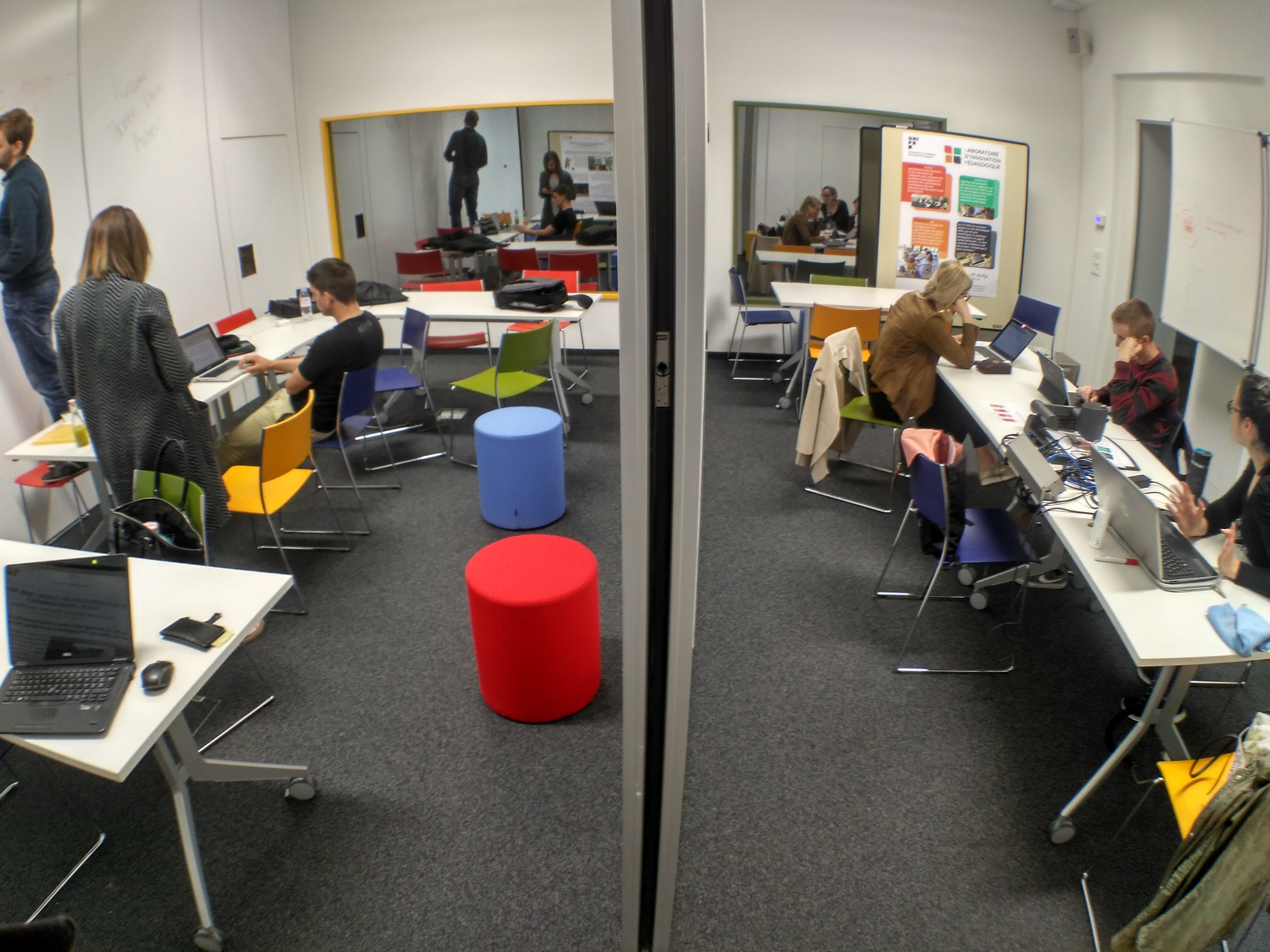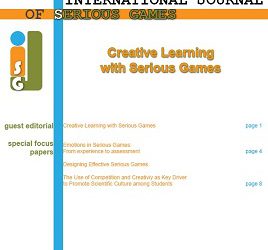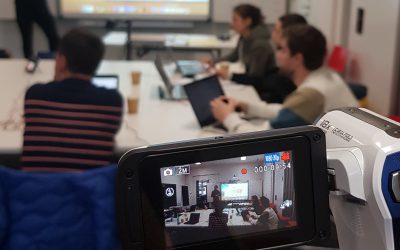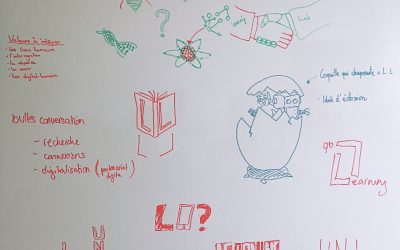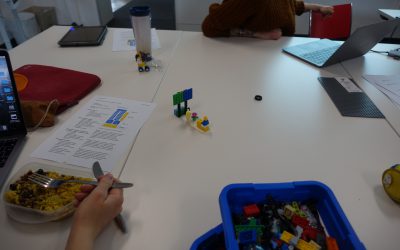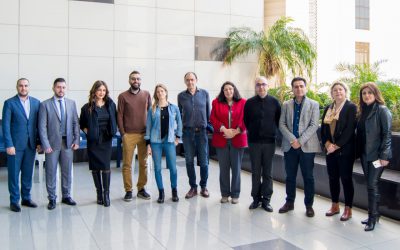co.LAB – A Digital Lab for the co-Design, co-Development and co-Evaluation of Digital Learning Games
Interest in Digital Learning Games (DLGs) has flourished at all levels of education. Digital Learning Games contribute to increasing students’ motivation and engagement, and are effective tools to support learner centered teaching practices. However, the design, development and uses of DLGs remain an issue due to the gap between teachers, game developers and researchers.
At the crossroads between educational and computer sciences the goal of the co.LAB project is to improve the design, development and uses of Digital Learning Games at all educational levels in Switzerland. This goal will be achieved by the development of what we call the co.LAB: a collaborative methodological framework between teachers, game developers and researchers in educational science, associated with a collaborative digital platform dedicated to co-design, co-development and co-evaluation of DLGs.
With the development, implementation and assessment of the co.LAB methodology and digital platform, we want to answer the following research questions (RQ).
RQ1: What methodology is needed to support collaborative DLG design and development?
RQ 2: What are the digital platform features necessary to support the collaborative DLG design and development process?
RQ 3: What are the effects of the methodology and digital platform on development cost and duration (efficiency)?
RQ 4: What are the effects of the methodology and digital platform on the quality of DLGs produced (relevance and effectiveness)?
RQ 5: What are the drivers for adoption of the methodology and digital platform by the educational, game developer, and research communities?
Following a design-based and mixed methodology, the co.LAB methodology and digital platform will be implemented and tested with the design, development and evaluation in real educational contexts of two showcase games dedicated to medical education (higher education) and computational thinking (secondary education). They will be used as a proof of concept. The experimentations will be carried out with classes both in a secondary school and at a university of applied sciences. The data collected will be based on an ethnographic approach on the one hand (questionnaires and focus groups carried out with stakeholders), and on the digital traces of users of the platform on the other hand.
By including a digital infrastructure for digital learning resources development and by providing, as a use test result, two digital learning games the project is fully in line with the PNR77 goals and more specifically with the module “Education, learning and digital change”. In addition, the co.LAB methodology, digital infrastructure and laboratory may serve both as an example of the introduction of digital in education and as a basis for future co-development of open digital educational resources in general.
Durée du projet
01/2020 – 12/2023
Financement
Fonds National Suisse

Requérants principaux
Dominique Jaccard HEIG-VD et Eric Sanchez, Université de Fribourg
Partenariat
Haute Ecole d’Ingénierie et de Gestion du Canton de Vaud
Membres du projet
Estelle Prior Unige
Mariem Jaouadi Unige
Membres associés
Nadine Mandran LIG/U. Grenoble
Matthieu Vermeulen IMT Nord Europe
Emmanuel Beffara U. Grenoble
Gaëlle Guigon IMT Nord Europe
Jérémie Humeau IMT Nord Europe
Anthony Fleury IMT Nord Europe
Contact
Eric Sanchez (eric.sanchez@unifr.ch)
Dernières actualités relatives à cette recherche
Nouvelle publication du LIP
Oubahssi, L., Piau-Toffolon, C., Loup, G., & Sanchez, Éric. (2020). From Design to Management of Digital Epistemic Games. International Journal of Serious Games, 7(1), 23 - 46. https://doi.org/10.17083/ijsg.v7i1.336 Abstract The development of pedagogies that can...
Une nouvelle recrue pour le LIP
Le LIP accueille Laura Molteni en temps que chercheure junior pour le projet LETS. Laura est titulaire d'un Master en sciences de l'éducation de l'Université de Fribourg. Elle sera impliquée dans la gestion du projet ainsi que sur les aspects scientifiques en lien...
Notre Lunch&Discover#3 exceptionnellement par visioconférence!
Tous les derniers mercredis du mois, un nouvel événement Lunch&Discover est organisé par le Learning Lab autour de différentes thématiques. Ce Lunch&Discover#3 aura pour objet le passage de nos enseignements à distance présenté dans le cadre du centre...
Analyser une séance de travail menée dans le cadre d’une RoC ?
Si vous, visiteur du site du Laboratoire d’innovation pédagogique, lisez ces mots, c’est que vous avez très probablement déjà entendu parler de Recherche orientée par la Conception (RoC) ! Si ce n’est pas le cas, ouvrons cette parenthèse. En deux mots, la RoC est une...
Covid-19, les services universitaires se mobilisent !
Pilotés par Elodie et Elsa, deux des robots de télé-présence du Learning Lab sont allés à la rencontre des étudiants de l'Université de Fribourg en quête d’idées pour un logo (cf. article). A l’heure où les mots “épidémie”, “quarantaine” ou encore “contamination” sont...
Le Learning Lab sollicite votre aide pour la création de son nouveau LOGO !
Depuis début 2020, le Learning Lab s’est lancé dans un processus de création d’une nouvelle identité visuelle. Pour parvenir au design final, cet organisme a décidé d’intégrer les idées des divers acteurs de l’université. Il se veut proche de la communauté...
Vous désirez en savoir davantage sur les cours hybrides ? Les inscriptions sont ouvertes pour notre nouveau Lunch&Discover !
Tous les derniers mercredis du mois, un nouvel événement Lunch&Discover est organisé par le Learning Lab autour de différentes thématiques. Ce Lunch&Discover#3 aura pour objet la présentation d’un cours hybride donné dans le cadre du centre DID@CTIC....
Le Learning Lab revient sur son Lunch&Discover#2
Le deuxième Lunch&Discover s’est déroulé ce mercredi 26 février dans la salle du Learning Lab. Une dizaine de participants y ont participé, amenant (en plus de leur lunch!) plusieurs questions et idées très intéressantes concernant les cours hybrides. Le...
2ème rencontre de LETS – Learning Lab network à Beyrouth
En février 2020, le LIP s'est déplacé à Beyrouth à l'AUL (Arts, Sciences & Technology University in Lebanon) pour la seconderencontre du projet LETS – Learning Lab Network. Cette rencontre s'est déroulée sur trois journées au cours desquelles les questions de...
Simon Morard débute une thèse de Doctorat après avoir terminé son mémoire de Master
Réalisé sous la supervision du Professeur Eric Sanchez, ce mémoire portait sur l’évolution et le partage des praxéologies entre professionnels impliqués dans un contexte de conception collaborative d’un jeu éducatif. Simon Morard est ressorti de sa soutenance le lundi...

